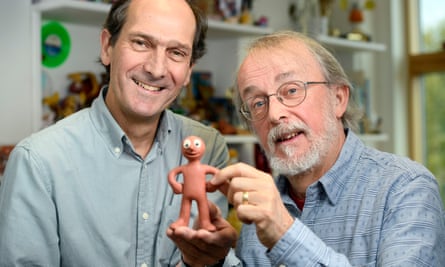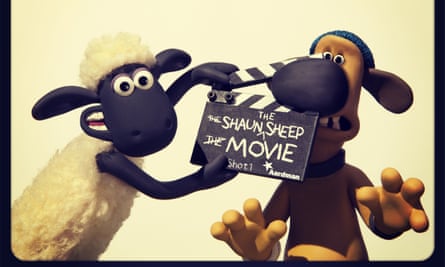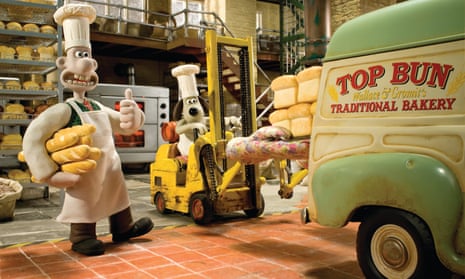The owners of Aardman, the animation studio behind Wallace & Gromit, Shaun the Sheep and Morph, are handing over a 75% stake in the business to their 140 employees in a bid to protect the Bristol-based company’s independence.
Peter Lord and David Sproxton, who founded the UK’s biggest animation production company while still at school, are set for a multimillion-pound payout as part of the deal, under which they will together continue to own a quarter of Aardman Holdings, the company’s parent group.
From their early days making hand-drawn animations which they sold to the BBC while still teenagers, the pair now oversee an international group responsible for animated feature films such as the Oscar winning The Curse of the Were-Rabbit and this year’s Early Man, as well as video games and adverts for companies from DFS to Chevron.
On Friday, the company brought out its first major console game 11:11: Memories Retold, which follows two characters on opposing sides of the first world war, and Shaun the Sheep Movie: Farmageddon will be released next year.
It also makes millions from merchandising and licensing the rights to characters, putting Shaun the Sheep and Wallace & Gromit on everything from cafes to cushions around the world.
Aardman Holdings is expected to make sales of £30m this year and profits of about £2.5m, similar to last year, boosted by income from selling the rights to Shaun the Sheep, who now appears on theme parks in Japan and Sweden.

Sproxton and Lord told the Guardian the employee ownership scheme was being funded out of the company’s cash reserve which stood at £18m in December last year, according to the latest accounts filed at Companies House.
Sproxton said: “We are balancing what we are comfortable taking out and what doesn’t stress the company out. We have been thinking about this a long time and built up considerable cash reserves so we could do this without borrowing any money.”
Employees will own their majority stake in the business via a trust, similar to the way the John Lewis Partnership is organised.
The 140 employees, and freelancers, of which there are currently 180 working for Aardman, will also continue to receive a share of profits. Anyone who has worked for the company for at least three months of any financial year is entitled to a bonus.
Staff will have an input into the running Aardman via a workers council, while the senior team will sit on a new board of directors which will lead the business and decide on the staff bonus, reporting to the trust’s board.

The company is aiming to appoint a replacement for Sproxton, who acts as managing director, within the next year after which he will step back to become a consultant to the business. Lord will remain in his role as creative director for the company for up to five years, but a new creative head of feature films will be hired.
“We’re not quitting yet,” said Lord. “We are doing this because we love the company and because we love it we think this will be the best things for it. This is not about David and I leaving. It is a continuity deal.
“We always believed that independence was our strong suit. We didn’t have to dance to anybody else’s tune and could make our own decisions.”
Sproxton and Lord made their first animations after meeting at Woking Grammar School, using cut-outs from magazines and an ageing clockwork camera owned by Sproxton’s father, a BBC producer and keen amateur photographer.
They sold their first clips to the BBC’s Vision On children’s programme while in sixth form and continued to treat animation as a summer job while at university, creating the hand-drawn Aardman character that gave the company its name in 1972.
Wallace & Gromit creator Nick Park joined Aardman in 1985. He met Sproxton and Lord while he was at the National Film and Television School, where he was working on his student film, Wallace & Gromit’s first adventure, A Grand Day Out.

Park, the creator of some of the company’s best known output including Shaun the Sheep, will retain a key role in the company sitting on a new executive board. He will also continue to receive dividends and royalty fees related to his creations from subsidiary companies such as Wallace & Gromit Limited, of which he is a co-owner with Aardman Holdings.
Sproxton and Lord hope that employee ownership of Aardman will encourage the team to come up with more creative ideas and ways of working once they have a stake in the company’s future.
It is also intended to put less strain on the business financially than a management buy-out backed by debt or sale to a major studio might have done.
“In an age of uncertainty there is a sense of security as [our staff] know their job is safe as long as they come up with ideas,” Sproxton said.
“If we sold Aardman [to a big studio] it would just become an asset on the balance sheet to be traded. They could say, let’s turn it all over to CGI and shoot it in Singapore.”
Brexit and changing trends in the film and TV industries have created difficulties in the market, despite a mini boom for creative producers thanks to the battle for subscribers between Netflix, Amazon and the traditional players.
Sproxton and Lord believe employee ownership and the company’s varied slate of work will protect Aardman in the future when Brexit could make the UK film industry more vulnerable than ever to US imports.
Lord said: “Our desire is to produce British animated films. The world audience have got American films coming out of their ears. We believe in a different voice, a different culture with different references and sense of humour, aimed at a global market but British.”
Six of the best: Aardman animations through the years…
Morph
Sproxton and Lord’s gobbledygook-speaking, shape-shifting, brown clay stop-motion character featured in short films made for BBC children’s art shows Take Hart and Hartbeat in the late 1970s and early 80s. New episodes, crowdfunded by fans, launched on Morph’s own YouTube channel in 2014 and were broadcast by the BBC the following year.
Sledgehammer
Aardman worked on the stop motion animation in the groundbreaking music video for Peter Gabriel’s 1986 hit.
Creature Comforts
Park’s 1989 Channel 4 mockumentary short matched animated zoo animals to a soundtrack of people talking about their homes. It beat Park’s own A Grand Day to the best animated short film Oscar the following year and spawned the popular early 1990s TV advertising campaign for Heat Electric.
Wallace & Gromit
Aardman’s best known characters made their debut in Park’s student film A Grand Day Out, first broadcast in 1989, and featured in the TV follow ups The Wrong Trousers, A Close Shave and A Matter of Loaf and Death. Park picked up Oscars for The Wrong Trousers, A Close Shave and the 2005 Wallace & Gromit feature film The Curse of the Were-Rabbit.
Chicken Run
Aardman’s first feature-length production, directed by Park and Peter Lord and released in 2000, featured the voices of actors including Mel Gibson, Jane Horrocks and Miranda Richardson and is the highest-grossing stop motion animated film ever, ahead of The Curse of the Were-Rabbit, with global box office takings of nearly $225m (£172.5m).
Shaun the Sheep
Developed from a character first seen in A Close Shave, the children’s show debuted on the BBC in 2007 and became a global TV hit, now running to 150 episodes. TV spin-off Timmy Time and Shaun the Sheep Movie followed; a second feature film, Farmageddon, is due next year.
